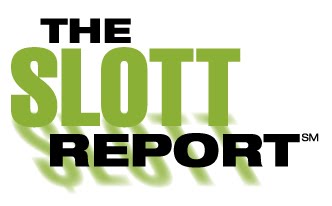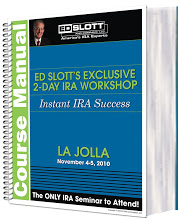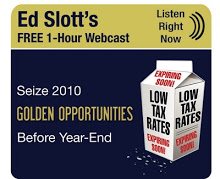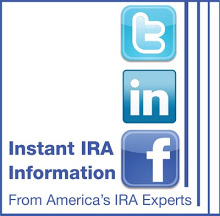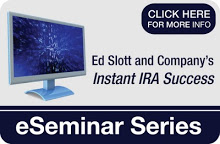Monday, March 30, 2009
Now Is the Time...Turn IRA into a Roth
BUT IT IS.
The Associated Press' Dave Carpenter wrote a March 28th article about converting your IRA to a Roth, and Ed Slott concurs that you should pay your IRA taxes now (at a MAJOR DISCOUNT) rather than hold off until the future.
"You can buy off Uncle Sam as a partner on your retirement account at bargain rates," Slott told Carpenter." Once the market comes back, you're going to be sitting pretty with money that will never be taxed again."
CLICK HERE to read the article in its entirety.
Friday, March 27, 2009
How the Madoff Situation Relates to You
We need to keep sight of the long term nature of stock investments. In time, we will recover. Things may never be the same in the future, but who is to say that is a bad thing?
Putting your money under a mattress is never a good idea. Much has been written about the red flags in the Madoff case. As an individual investor, you need to take some responsibility for your investments. Make a list of the red flags and check up on your advisor from time to time so you don't become a victim of the next scam artist.
If you are an advisor, now is the time to talk to clients that have stuck with you over the last year and tell them thank you. Thank them for their faith and confidence in you. If you are a consumer, don’t be too discouraged or negative. If you are satisfied with the interaction you have with your current advisor, then stick it out. Maybe you want to say thank you to your advisor. If you don't have an advisor and your investments have declined, now is the time to look for an advisor. You probably can’t afford free anymore.
Thursday, March 26, 2009
The Slott Report Mailbag: March 26th
Our next 2-Day IRA Workshop will be in Phoenix, Arizona on November 5-6. More information will appear at http://www.irahelp.com/ starting next week.
Until then, from Baltimore's Inner Harbor, here is this week's Mailbag!
1.
Ed and Company,
I have four IRA rollover accounts, one each in two banks and two in a third credit union. My questions are as follows.
1. When I reach 70 1/2 and begin mandatory distributions do I have to take the appropriate amount from each account or can I take the entire mandatory distribution for all accounts from just one of the IRAs?
2. Assuming the answer to question 1 is that I have to take a mandatory distribution from each account, can I treat the 2 CDs in the credit union as one account and take the mandatory distribution for both CDs from just one of the CDs?
Thanks,
John Smith
La Mirada, CA
Answer:
The general rule is if you have like IRAs -- your IRAs and not an inherited IRA -- you must calculate the required minimum distribution (RMD) from each IRA. You can however aggregate the amount and take it out of any one of the IRAs. This will satisfy your RMD for any given year. You can even pro-rate the total RMDs from any one of the IRAs. You should check with your IRA providers to ensure they will honor taking RMDs from only one IRA.
2.
Good morning,
At retirement I will go to live in an apartment that I own in South America. I do not want an IRA, annuities, etc. I prefer to take all my retirement funds, deposit them in a local bank, and live off the interest, leaving all, or most, of the principal intact. Is there a way to do this through, for example, a self-directed IRA, or must I pay all taxes at once to the IRS and take what is left to South America?
Thank you,
Barry Shelton
Answer:
In order for your money to retain it's favorable tax status it must remain in the IRA. I don't believe South America has IRAs like the US. You might want to look for a US custodian that will allow you to have a self-directed IRA and then perhaps you can direct them to buy CDs in South American banks. You also would want to inquire about the income tax that will be due on the distributions. Good luck.
3.
Sirs,
How can I dump my 401k into a Roth IRA? I am 46 and still working. Is there any hope?
Thanks,
Ric
Answer:
Your current 401(k) plan must allow for what is called an "in service distribution". If your plan does not have this type of provision you could be penalized. For example, many plans state if you take a distribution you will be prohibited from contributing to the 401(k) plan for one year and not receive a match if there is one. Keep in mind that your Modified Adjusted Gross Income (MAGI) in year 2009 can not exceed $100,000. If it does you will not qualify to convert to a ROTH IRA. In year 2010, the $100,000 limit will go away. Please be very careful if you are allowed to proceed. There are several issues such as withholding and a trustee-to-trustee transfer that you want to be mindful of.
4.
Hello,
It is my understanding that the current $ 2 million tax free amount per person is going to be eliminated in 2010. Is this true? If so, what amount is then tax free to pass on to our children? How does this affect financial plans made today? Any information on this subject would be most appreciated.
Thank you,
Yvonne Brizzolara
Answer:
I believe you are referring to the Unified Credit Amount that applies to Federal Estate Tax. The Unified Credit amount in year 2009 is $3.5 million. This is the largest ever increase in the federal estate tax exemption from one year to the next ($2.0 million in 2008 to #3.5 million in 2009). In year 2010, for that year only, the estate tax is repealed. If Congress does act to make changes in year 2011 or earlier it will revert back to $1 million. The top Federal Estate Tax rate in 2009 is 45% and in 2011 it is scheduled to go back to 55%.
It is very important to consider the Unified Credit Amount when doing your estate plan. It is generally assumed that Congress will make some changes in the near future regarding estate taxes. Stay tuned.
Tuesday, March 24, 2009
Ed Slott on CNNMoney.com
Here is an interview featuring Ed Slott courtesy of CNNMoney.com. You can also access this video from the lower left-hand corner of our homepage.
Monday, March 23, 2009
Tax Season Tips
- You converted a traditional IRA to a Roth IRA during 2008, a year that saw equity prices rise significantly. You can do a Roth recharacterization -- a do-over in the IRA world. "You can undo a conversion before you file your 2008 tax return so that you won't pay tax on value that has been wiped out by the stock market," Slott told Tribune Media Service's Mark Miller.
- Here is a tip that is overlooked by many beneficiaries. If you inherited an IRA in 2008, took distributions from that IRA, and the person you inherited from had an estate that paid federal estate taxes...you are entitled to a MAJOR INCOME TAX REDUCTION. It is called the "Income in Respect of a Decedent" or in simple terms, IRD. "You take it as a miscellaneous itemized deduction, not subject to the 2 percent adjusted gross income limitation," Slott explained to Miller.
- It is also important to know that IRD deduction is exempt from alternative minimum tax. This deduction can get tricky, so make sure to consult with a financial advisor or accountant to know if you qualify.
For some other major tax-saving tips, read the article in its entirety at the following link.
Friday, March 20, 2009
The Slott Report News: March 20, 2009
Today, we are keeping you up to date on what has been going on this week "In The News". Have a great weekend!
- Ed Slott and Company IRA Technical Consultant Beverly DeVeny was asked about common mistakes consumers and their advisors make when the consumer leaves a job? What to do with that retirement account? According to DeVeny, many consumers fail to do a rollover from the 401(k) company plan to an IRA. The result is tax on that money. You can read the entire article at marketwatch.com by clicking on this link.
- The biggest headline in the news recently has been Bernard Madoff's multi-billion dollar Ponzi scheme and the millions of investors it has affected. Investors in IRAs may be able to claim a theft-loss deduction on their returns. It would more likely affect Roth IRAs compared to traditional IRAs. Yet, no one is exactly sure because the IRS announcement didn't mention IRAs. Ed Slott said on the matter, "Once you have a basis and you've lost it, I would think these rules would apply. Nobody knows, but I think you would have a case to say, 'Now I truly have a loss due to fraud. I should be able to use these new rules.'" To read the marketwatch.com article in its entirety please click on this link.
Thursday, March 19, 2009
The Slott Report Mailbag: March 19th
Yet, we still took out time to answer questions from some very concerned consumers. Below are our answers. Enjoy!
1.
Dear Mailbag,
I am one of three children and my father has listed us three as primary beneficiaries to his IRA and my 2 children (the grandchildren) as secondary beneficiaries. Do all three primary beneficiaries have to decline the inheritance before the secondary ones can receive it? Or if I (as primary) decline the inheritance will my children receive my portion despite what the other 2 primaries decide? If each primary can decide regardless of the other primary beneficiary decisions, then will my portion be divided between my children only and not the other secondary beneficiaries?
Thanks for your insight,
Suzanne
Answer:
Suzanne,
You might want to have your father consider naming " my issue per sterpes" instead of all the children. With this beneficiary designation if you or any other sibling disclaims their share will go to their children. Any disclaimer would have to be done prior to 9 months after your father's death. Please consult with your attorney and or accountant before making any changes in the beneficiary form for your father's IRA.
2.
Dear Mailbag,
Great work, you guys have never been stumped!
In 2009 I rolled over the bank/cash account portion of my SIMPLE account into my Roth IRA. I qualified for the income and time line requirements associated with the transfer. I have tax questions:--Do I have to pay taxes on the rollover amount now? I've heard conflicting information - that taxes need to be paid within 90 days no matter what (I have an S-corp and don't anticipate owing taxes in 2009)???--My rollover came from my account at a financial investment group to my bank. Although the paperwork I filled out was for a direct rollover from my SIMPLE to a Traditional IRA to a ROTH IRA, the bank deposited the amount into my regular checking account before applying to my ROTH. I was concerned that would change the transaction to a distribution (and I would be liable for 10% penalty as I am under 59 1/2) - my bank said no, but I want to double check with an expert. Any thoughts? The entire rollover process was done within 30 days. Thanks so much!
Answer:
When you convert to a Roth IRA prior to year 2010 the income tax due on the conversion is payable in that year. You have however, until April 15th of the following year to pay any tax due. You can however pay it earlier in the year. Please check with your accountant who would know your personal tax situation.
The money going from the traditional IRA into the checking account and then into the Roth IRA is OK. However, be careful of the 60 day rule. Within 60 days it must go into the Roth. Also keep in mind that after the transfer to the Roth IRA you will not be able to do another similar transaction for one year. It is always better to go directly from a traditional IRA to a Roth when you can.
3.
"Stay Rich for Life!" is a very informative book; however, I have one question concerning naming beneficiaries outside of the USA. I am a citizen of the USA residing in California; my family resides in Singapore and are citizens of Singapore. Members of my family are named as beneficiaries in my will, retirement and bank accounts. Are any of these assets subject to federal and state tax?
Thanks,
Yook-Lan Leong
Answer:
Yook-Lan,
Thank you for the kind words. As a citizen of the USA, all of your assets will be subject to federal estate tax at your death. Including your IRA assets. Your beneficiaries, citizens of Singapore, may find that the money they receive from your IRA may be subject to non resident alien (NRA) withholding tax. Many foreign countries have tax treaties with the US. You should check with your attorney or financial advisor for more details regarding Singapore.
4.
I read your book, "The Retirement Savings Time Bomb" and have decided with the direction of the new administration and tax increases I will be rolling over my IRA in 2010 to a Roth. You mentioned in your book that the tax can be delayed till 2011 and 2012. Will this delay be at the 2010 tax rate or the rate in effect at the date it is paid (2011 and 2012)? This will be very important with the tax rates going up in 2011 by about 5%! Have you heard also of any discussions by the Obama administration about the Inheritance exemption amount? Do they have any proposal to revise from the 1,000,000.00 amount?
Thanks,
Jack Eggspuehler
Ida Grove, Iowa
Answer:
Yes, if you convert in year 2010 you could pay the income tax due in 2011 & 2012. The tax would be based on the tax rates in those years. However, if you think that the tax rates may be going up you can pay the tax in 2010 and not risk a tax increase. Or you could pay it all in 2011.
We don't know what the Obama administration will do about the estate tax exemption. We have heard a number of $3.5 million. However, that can change. Please be sure to check our web site http://www.irahelp.com/ from time to time to be abreast of any new developments.
Friday, March 13, 2009
The Slott Report Mailbag: March 13th
Advisors can register at www.irahelp.com, and consumers reading the questions and answers below can steer their financial advisor to our website for information on all of our training opportunities.
1.
Ed,
I have attended your seminars, read one of your books and additionally subscribe to the PMC desk reference. My question needs to be definitively answered regarding whether or not a person who has inherited an IRA can then designate their own beneficiary going forward. Apparently, federal law does not dictate this but it reverts to state law. Your book states that absolutely you can and SHOULD designate your own beneficiary. I have been told that you can't and also that if you inherit an IRA and then you die, any remainder in that IRA goes to probate. I'm confused! Can you give me any definitive answer or direction?
Thanks,
Diana Bowman D 'Amico
Answer:
Diane,
An individual inheriting an IRA can absolutely name their own beneficiary. This was even mentioned in the final regulation dated April 17, 2002. The final regulations took effect 1/1/2003. So long as you have an individual as beneficiary the assets will not be subject to probate.
2.
In the introduction to "Stay Rich for Life," you talk about a woman who funded her Revocable Living Trust with an IRA. You said her action subjected her account to immediate taxation, as if it had been cashed out. It was not clear, however, whether she actually emptied the IRA and transferred the cash to the trust, which is actually cashing out of the IRA, or simply re-naming the IRA under the Living Trust, but leaving the retirement money untouched within the IRA. I believe that, as long as the IRA money itself remains untouched within the IRA, that it is not subject to taxation, even if the IRA account itself is placed within a Revocable Living Trust by renaming the beneficiary of the account from the individual to the Living Trust. Can you expand on this important question?
Thank you
Answer:
If a trust is funded (meaning money or assets were put into the trust) by an IRA it would be considered a taxable event. You can not fund a trust without the IRA assets being income taxed. An individual can name a trust as beneficiary of an IRA. In that case there would not be a taxable event. Even though a trust is named a beneficiary at the IRA owner's death the assets in the trust can be retained in the decedents IRA. The required minimum distributions would then flow to the trust and be considered taxable income to the trust or the trust could pass it out and it would then be taxable to the recipient. If however, all the assets from the IRA went into the trust it would be a taxable event. As previously mentioned, the assets can stay in the decedents IRA. The account should re-titled as follows: decedents name, decedents date of death, for the benefit of, and the name of the trust.
3.
I recently read in a financial planning magazine that non-spouse heirs of a Roth IRA can only distribute tax free the balance of the account as of the date of death of the deceased owner. Any subsequent growth that is distributed will be taxed to the heir. I thought Roths were always tax free to the heir (assuming the deceased owner would have been able to make qualified distributions).
Which is correct?
Paul Scudiere
Answer:
Paul,
All qualified distributions from a Roth IRA are tax free to whomever is the beneficiary. The beneficiary of the Roth IRA, at the time of the IRA owner's death, can choose to inherit the Roth IRA and take required minimum distributions over their own life expectancy. The distribution would be income tax free. They would, however, have to take the proper required minimum distribution each year to avoid a 50% penalty.
Tuesday, March 10, 2009
The Slott Report News: March 10, 2009
This new feature will allow our blog followers to keep abreast of the information disseminated by Ed Slott and Company.
- Are losses incurred in IRAs deductible? The simple answer is no. However, for tax purposes, it may be possible to deduct IRA losses if all the funds are withdrawn from all IRAs a client owns. Ed wrote an article in Investment News about the process of deducting IRA losses...but is the small tax benefit worth the many hurdles? Ed explains his belief in this early March column.
- Donald Jay Korn wrote an article for Investor's Business Daily that talked about how to deduct losses on odd assets. Korn presented the question, "what about putting your assets back inside a Roth, where earnings can grow tax-deferred?" Ed Slott answered by pointing out that if you want to open a new Roth IRA, wait until the next calendar year. Why? Read Ed's take and the rest of Donald Jay Korn's article by clicking on this link.
- Mark Miller of The Columbus Dispatch aptly pointed out that tax season is a good time to do long-term planning. One of Miller's bullet points "Reverse a Roth" was discussed by Ed in the article. If you or one of your client's converted an IRA to a Roth in 2008 when equity prices were higher, the law allows for a Roth re-characterization. Ed's take on that and other topics can be found by clicking on this link.
Thursday, March 5, 2009
The Slott Report Mailbag: March 5th
1.
I would like to leave my IRA to my grand kids? On IRS info it says they have to take the money out after my death. How do I set-up my IRA account, or what should I do?
My account is an Individual IRA, and I would like to covert to ROTH IRA if my grand kids are not forced by IRS to take the money out (after my death).What is the solution? Please help.
Thank You,
Maria
Answer:
You can leave your IRA to your grandchildren by naming them as your primary beneficiary on the IRA designation of the beneficiary form. Within a year after your death, your grandchildren will have to take required minimum distributions (RMD's) each year based on their life expectancy factor. It would be based on their attained age at your death. The life expectancy factor can be found in the IRS Publication 590.
For example, if you have 3 grandchildren ages 20,18 & 21 at your death they would use the following life expectancy factors: 25.2, 27 & 24.4. Using the 20 year old, he/she would be required to take out 1/25.2 of the balance the first year and reduce that number (25.2) by one each subsequent year. The same rational would apply to the other grandchildren. Each year however, they can take as much as they would like even if the amount is greater than the RMD. If however, they took out less than the RMD they would incur a 50% penalty.
By 12/31 of the year following your death, the grandchildren should split the account in thirds. Each account would then be titled: your name, date of death, for the benefit of, grandchild name.
If you convert to a Roth IRA you would not have to take RMD's if you didn't need the money. The grandchildren however, will have to take RMD's from the Roth IRA after your death. However, any amount they take out would be tax-free.
2.
I have a question about using some of the techniques you outline in your Stay Rich for Life book. How does a woman with no children protect herself using your tools if she's married to someone with children from a previous marriage? Would my husband have two life insurance policies?
And how would I pass along my financial contributions to our marriage to my nieces and loved ones when I die, especially if I die before he does?
Sincerely,
CJ
Answer:
You can name anyone including your nieces as your primary beneficiary of your IRA. At your death they could then inherit your IRA and take distributions over their life expectancy factor found in IRS Publication 590. If you named your husband as your primary beneficiary and your nieces as contingent beneficiary and you die first your husband would inherit your IRA. He could at the time name anyone he wanted to be his primary beneficiary.
Monday, March 2, 2009
Reminder: Final Webcast Tuesday at 4:00 p.m. ET
You can sign up for the webcast by clicking this link. You will receive a confirmation e-mail upon registering and an e-mail with detailed access instructions the day of the webcast.
Again, Ed Slott's Webcast is Tuesday, March 3rd at 4:00 p.m. ET. You can register for the webcast and other webcast dates at the following address: http://www.irahelp.com/webcast_reg
or just click on the webcast image in the top left-hand corner of The Slott Report.
